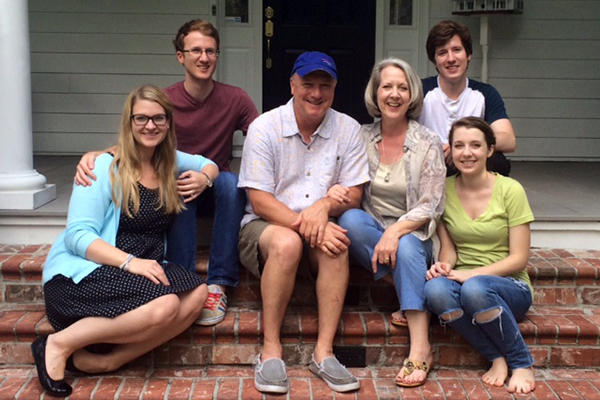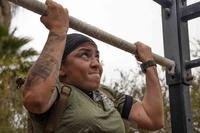When Terri Barnes married into the Air Force 31 years ago, she was joining the "family business."
An Air Force brat, Barnes and her husband, a chaplain, recently retired from the service to a home in Summerville, South Carolina. But during her lifetime, she lived at 16 military duty stations, including four overseas assignments and Alaska, and dealt with five deployments with her husband as well as two with her father.
All of that means that when it comes to military life, Barnes has been around the block. But what about military transition? Transitioning from life as a military kid directly into life as a military bride means that you have been a part of the military for your entire life -- until, that is, you retire.
Barnes' husband retired in 2015 after 30 years in the military, and Barnes transitioned from a military life writer and columnist to a special projects editor for Elva Resa Publishing, which specializes in books for military families. They also have three adult children spread throughout the U.S.
So how is transitioning to civilian life after a lifetime in the military? Here's what Barnes told us:
Military.com: Think back to before you got out. What did you think transition would be like?
Barnes: Having never actually lived a civilian life, I tried not to have too many preconceived ideas. I expected to feel some sadness and loss. At the same time, we were moving into our first home (as owners) and looking forward to life in our little town, where we have other military friends nearby.
So far, we have loved it and the transition has been smooth. However, I don't think we will ever truly be civilians. Military life has shaped us and the way we think. We are still a military family in a new season and new chapter.
Q: How did what actually happened compare to what you imagined?
A: Our transition has been very smooth. It felt much like a PCS. We moved to a military town, although we are not connected to the base. That felt strange at first, to go to the commissary and know that we didn't "belong" in the sense that we weren't attached to the base.
Q: What do you wish you could go back and tell yourself about military transition?
A: Save more money! However, I could tell myself that all day and not be able to change the circumstances. Our retirement happened at a time of transition for our entire family. Two graduations in two different states, our son's wedding in another state, and two separate moves to two new states -- ours to South Carolina and our daughter's to California for her first post-college job. Also, our youngest was starting college.
All of these things involved travel for the whole family to be together for these important events. Being together was wonderful, and was worth the expense. If I could have changed the timing, it would have been nice to plan to retire in a year that wasn't so transitional in so many other ways. On the other hand, all those times that we had all our family together made the year very special and bonded us together during the transition.
Q: What was your smartest military transition decision?
A: To retire in a military town where we have military friends. These factors definitely smoothed the transition for us and made integration into a new place much easier.
Q: What about transition worked better than you thought it would?
A: Leaving the way of life I had always known was not as painful as I thought. I think having military friends and being in a military town were instrumental.
Q: What has been the best thing to come out of getting out of the military?
A: Stability -- we were ready to put down roots for our whole family, after a lifetime of moves. Our children are adults now, and we wanted them to (finally) have a home base. So, the best thing for us right now is the stability.
Q: What transition resource did you love?
A: [My husband] got a lot of good information from the Air Force Transition Assistance Program. I mostly talked to friends who had just retired or were preparing to retire, and we exchanged information. Military spouse friends have always been my best resource.
Q: What transition tool do you wish you had?
A: Something to predict the unknown expenses. I know that's impossible, but we tried to estimate what life would cost after retirement, and it's difficult.
You can plan out a budget, but there are always unexpected costs, and expenses that are more than expected. You have to think about replacing insurance (health, dental and life), covering your living expenses, home owners expenses, which is also new to us. So expect more expenses than you think you will have, because you will probably have them.
Q: How did the transition out of the military affect your own job or career choices?
A: My job, as the military family columnist for Stars and Stripes, was so closely tied to my own life as the spouse of an active duty member that I felt it would be difficult to continue it in retirement. As a reporter, I could have continued. I loved my job, but it would have required me to spend a lot of time looking back at a chapter of my life that was finished, rather than looking forward to the chapter that was beginning. I was ready to look forward.
Q: Did you plan for your own career transition?
A: As my husband's retirement neared, I had been seeking the next step for me as well. I wanted to use my experience in writing and editing, my years in military life, and all I had learned as a columnist for eight years. Elva Resa Publishing, which specializes in books for military families, published a collection of my Spouse Calls columns in 2014.
The company also offered me an opportunity to edit an anthology of military family writers, Stories Around the Table. It turned out to be an excellent career segue, and a new way to serve military families. I'm still working for Elva Resa as the special projects editor, as well as doing freelance editing and writing. It turned out that my previous work had prepared me for and connected me with the opportunities for the next one. This new chapter has stretched me and challenged my abilities. I'm learning new skills and putting my old ones to use in different ways. It has made the end of active duty life feel like a new beginning.
Q: Tell us about your new civilian community. What advice do you have for spouses trying to find non-military community friends?
A: Having military friends still in our lives is so important to us. We need people who know our history, friends to whom we don't have to explain the way we have lived and our choices. They get us. We get them, and we have been the best support network for each other during this transition. We have friends here who are already retired, and friends who are preparing to retire and stay here in the area. So we are all looking out for each other and sharing advice, support and information.
At the same time, each of us is integrating into the community in different ways -- through work, volunteering. Our neighbors have been very friendly, and we've gone out of our way to connect in our neighborhood, having gatherings at our house, taking cookies and the rest. In other words, we do what we've done with every move, and the response has been positive. We've joined a local church, and are getting involved there. We are not limiting ourselves to just our military circle of friends, but they are our core network.
Q: How do you wish you had prepared yourself better?
A: Overall, I think we did pretty well, although we chose differently than many retirees. Most people find a job, and then decide where to live. We chose the place we wanted to live and then looked for work. After following the job for 30 years, we were ready to choose for ourselves where we wanted to be. That has been an excellent choice for us, though the tradeoff has been a few financial challenges.
-- Do you have a military transition story to share? Email amy.bushatz@monster.com to be considered for this series.






























